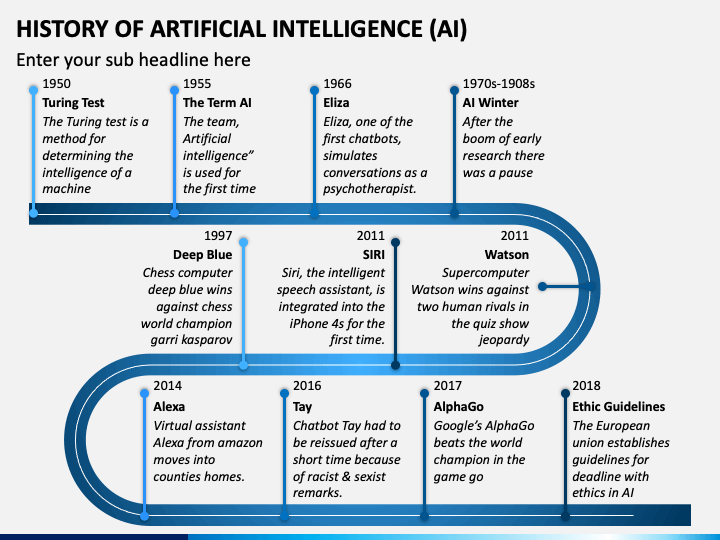

https://www.sketchbubble.com/en/presentation-history-of-artificial-intelligence.html
Brief History of Artificial Intelligence: from Turing to Chat GPT
AI has a rich history that stretches back to the mid-20th century, when pioneers like Alan Turing, John McCarthy, Marvin Minsky, and Claude Shannon began exploring foundational concepts like artificial neural networks, machine learning, and symbolic reasoning. Over the years, AI research has gone through periods of waxing and waning, including the AI winter of the 1970s and 1980s, and the subsequent revival of machine learning algorithms in the 1990s. In recent years, deep learning algorithms have enabled computers to process and interpret complex data, leading to breakthroughs in fields like natural language processing and computer vision. The EU has also recognized the importance of ethics in AI and established a deadline of 2024 for companies to comply with new AI regulations. In 2022, the release of ChatGPT (Generative Pre-trained Transformer), a large language model trained by OpenAI, demonstrated the enormous potential of AI for transforming the way we communicate and interact with machines. In the years to come many models like the ones trained by OpenAI are going to find themselves integrated into more and more systems such as word processing software, search engines and many more.
N. Gupta, & R. Mangla. (2020). Artificial Intelligence Basics : A Self-Teaching Introduction. Mercury Learning & Information.
Haenlein, M., & Kaplan, A. (2019). A Brief History of Artificial Intelligence: On the Past, Present, and Future of Artificial Intelligence. California Management Review, 61(4), 5–14. https://doi.org/10.1177/0008125619864925
Hecht, J. (2018). Managing expectations of artificial intelligence. Nature, 563(7733), S141+.
This guide was adapted from the Black Hawk College Library ChatGPT libguide. Use the following link to view the original guide: https://bhc.libguides.com/ChatGPT